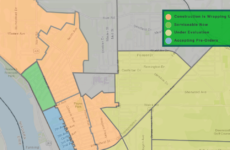Please click the link below to subscribe to a FREE PDF version of each print edition of the Niagara Reporter
http://eepurl.com/dnsYM9
By: Nicholas D. D’Angelo
Managing Editor
Analysis
On April 17th, 2017, the North Tonawanda Common Council approved a $20,000 salary raise, which ultimately was reduced to $15,000, for City Attorney Luke Brown. The increase raised his salary from $60,000 per year to $75,000 per year.
Despite happening four months ago, the outcome of this vote has gained new life in the last week after an editorial was written in the Niagara Gazette criticizing how it came to fruition. Specifically, the piece asserted that it was improper to do so during Student Government Day when students were involved.
After digging into the facts, it appears some may be intentionally distorting the issue for political points.
It has been a long-standing tradition on Student Government Day in North Tonawanda to give the kids, who are juniors and seniors in High School, a glimpse at what local government looks like.
“We try to go above and beyond to give them the full experience,” said Common Council President Eric Zadzilka. “Whether they are shadowing the mayor, a council member, or a department head, the goal is to make them feel like a part of our government for a day.”
Not unlike past years, the students were also able to actively participate in the Common Council meeting that evening.
When the meeting started, the students sat in each of the council members’ chairs at the dais with each councilperson, with an agenda in hand, behind them.
As the meeting progressed each councilperson would communicate with the student what to say, what motions to make, and etc.
Voting was no different. It was not up to the student how to vote on a certain agenda item. Rather, the councilperson, who was still seated directly behind them, would direct them how to vote.
Austin Tylec, the lone Independent/Democrat on the Council, took to Facebook after the meeting on April 20th saying, “minutes before the council meeting, I told my student to table the attorney’s request for a raise until further discussion at a later meeting, or to vote no if my motion to table was overturned.”
What Tyelc did not disclose in his post, however, is that the agenda had been set for an entire week prior to the meeting with this specific agenda item listed to be voted upon.
“Before each council meeting,” said Zadzilka, “all of the council members meet upstairs and go over the agenda. It’s important to make sure we are all on the same page in terms of keeping or removing certain agenda items if there is an issue.”
According to Zadzilka, there was no mention of a problem with the salary increase for the City Attorney prior to the meeting by any of the council members; including Tylec.
More importantly, the increase from $60,000 to $75,000 is a positive for North Tonawanda residents as it now compares to similarly situated municipalities.
“We looked at dozens of municipalities,” said Zadzilka, “and the majority of them ended up being between $75,000 and $95,000.”
The students did not vote themselves to increase Luke Brown’s salary. Rather, they merely mirrored the intention of each councilperson behind them who told them how to vote on the agenda item, as well as the dozen other items that evening.
That being said, the assertion that students were acting as “proxies” for each council member is simply invalid.
Voting as a proxy, by definition, implies that the person or entity you are voting on behalf of is not available. That could not be further from what happened here as each student who voted was accompanied by a councilperson.






















